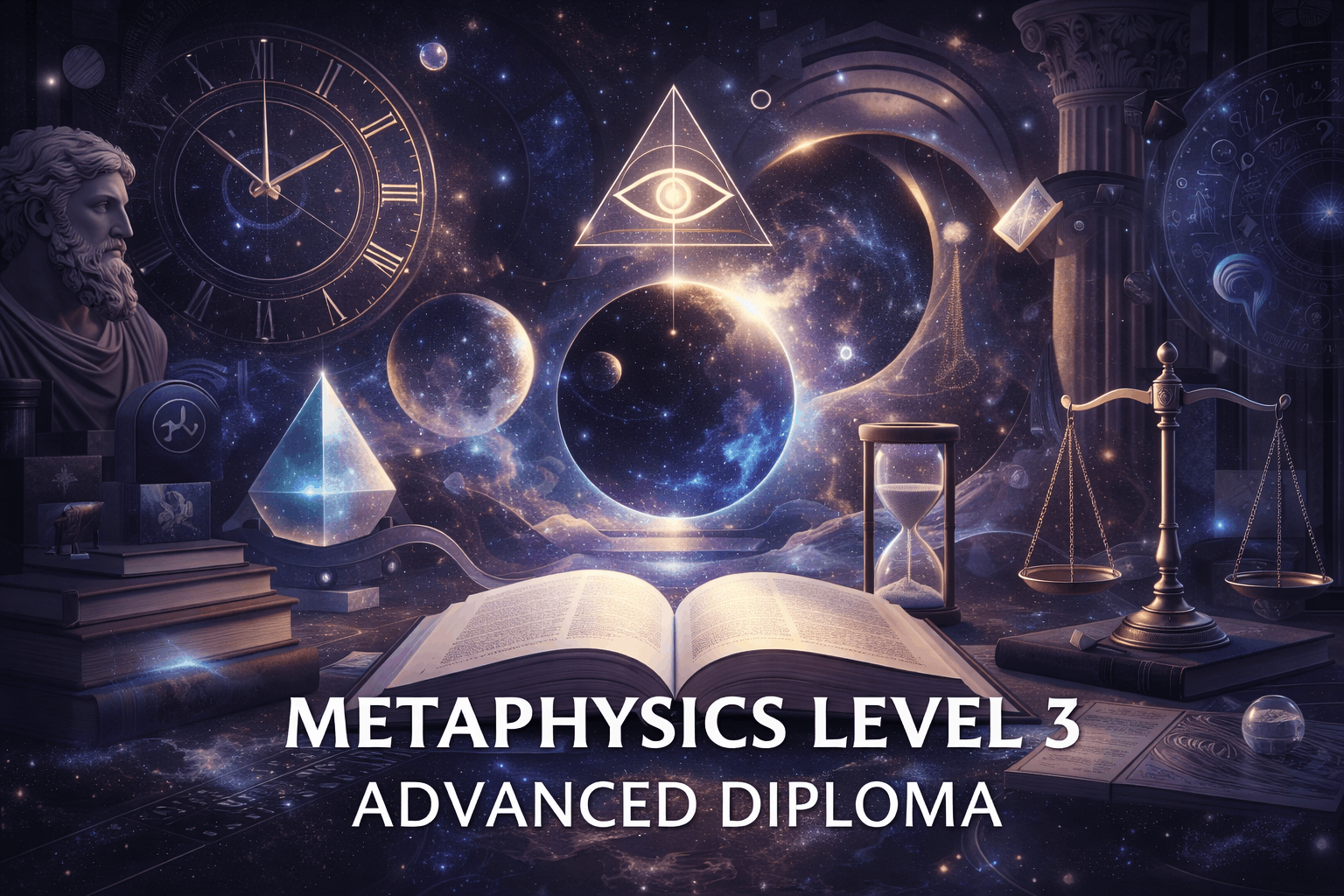Course Features
Price
Study Method
Online | Self-paced
Course Format
Reading Material - PDF, article
Duration
6 hours, 28 minutes
Qualification
No formal qualification
Certificate
At completion
Additional info
Coming soon
- Share
Overview
Metaphysics Level 3 Advanced Diploma offers an in-depth exploration of the fundamental questions that shape human understanding of reality, existence, knowledge, and consciousness. This course is designed to develop advanced philosophical thinking by guiding learners through classical and contemporary metaphysical debates, while encouraging analytical reasoning and critical reflection. Learners will examine how metaphysical ideas influence philosophy, science, ethics, and modern intellectual discourse.
The programme builds strong conceptual foundations in ontology, epistemology, philosophy of mind, and metaphysical cosmology. Learners gain the ability to analyse abstract concepts such as being, substance, identity, causation, time, space, and free will. By engaging with contrasting perspectives—such as rationalism and empiricism, dualism and materialism—students learn to evaluate arguments logically and articulate well-reasoned positions. The course also explores how metaphysical inquiry informs ethical theory, moral reasoning, and questions about human responsibility.
A key benefit of this qualification is the development of transferable academic skills. Learners strengthen critical reading, structured argumentation, and philosophical writing skills that are valuable across higher education and professional settings. The course also encourages intellectual independence by introducing contemporary debates and future directions in metaphysical research, helping learners connect traditional theory with modern challenges.
Metaphysics Level 3 is suitable for those seeking academic enrichment, preparation for higher-level study, or a deeper understanding of philosophical frameworks that underpin many disciplines. The structured learning approach supports steady progression while allowing learners to reflect, question, and engage at an advanced level. Upon completion, learners will receive a free course completion certificate. Multiple premium certificate and transcript options are also available for purchase if required. Students benefit from 5-star rated support available 24/7 via email, ensuring guidance and assistance throughout their learning journey.
There are no formal academic prerequisites for enrolment. Learners should have a good level of written English and an interest in philosophical discussion. An open and analytical mindset, along with the willingness to engage with complex ideas and reflective thinking, will support successful course completion.
Who is this course for?
Metaphysics Level 3 Advanced Diploma offers an in-depth exploration of the fundamental questions that shape human understanding of reality, existence, knowledge, and consciousness. This course is designed to develop advanced philosophical thinking by guiding learners through classical and contemporary metaphysical debates, while encouraging analytical reasoning and critical reflection. Learners will examine how metaphysical ideas influence philosophy, science, ethics, and modern intellectual discourse.
The programme builds strong conceptual foundations in ontology, epistemology, philosophy of mind, and metaphysical cosmology. Learners gain the ability to analyse abstract concepts such as being, substance, identity, causation, time, space, and free will. By engaging with contrasting perspectives—such as rationalism and empiricism, dualism and materialism—students learn to evaluate arguments logically and articulate well-reasoned positions. The course also explores how metaphysical inquiry informs ethical theory, moral reasoning, and questions about human responsibility.
A key benefit of this qualification is the development of transferable academic skills. Learners strengthen critical reading, structured argumentation, and philosophical writing skills that are valuable across higher education and professional settings. The course also encourages intellectual independence by introducing contemporary debates and future directions in metaphysical research, helping learners connect traditional theory with modern challenges.
Metaphysics Level 3 is suitable for those seeking academic enrichment, preparation for higher-level study, or a deeper understanding of philosophical frameworks that underpin many disciplines. The structured learning approach supports steady progression while allowing learners to reflect, question, and engage at an advanced level. Upon completion, learners will receive a free course completion certificate. Multiple premium certificate and transcript options are also available for purchase if required. Students benefit from 5-star rated support available 24/7 via email, ensuring guidance and assistance throughout their learning journey.
There are no formal academic prerequisites for enrolment. Learners should have a good level of written English and an interest in philosophical discussion. An open and analytical mindset, along with the willingness to engage with complex ideas and reflective thinking, will support successful course completion.
Requirements
Metaphysics Level 3 Advanced Diploma offers an in-depth exploration of the fundamental questions that shape human understanding of reality, existence, knowledge, and consciousness. This course is designed to develop advanced philosophical thinking by guiding learners through classical and contemporary metaphysical debates, while encouraging analytical reasoning and critical reflection. Learners will examine how metaphysical ideas influence philosophy, science, ethics, and modern intellectual discourse.
The programme builds strong conceptual foundations in ontology, epistemology, philosophy of mind, and metaphysical cosmology. Learners gain the ability to analyse abstract concepts such as being, substance, identity, causation, time, space, and free will. By engaging with contrasting perspectives—such as rationalism and empiricism, dualism and materialism—students learn to evaluate arguments logically and articulate well-reasoned positions. The course also explores how metaphysical inquiry informs ethical theory, moral reasoning, and questions about human responsibility.
A key benefit of this qualification is the development of transferable academic skills. Learners strengthen critical reading, structured argumentation, and philosophical writing skills that are valuable across higher education and professional settings. The course also encourages intellectual independence by introducing contemporary debates and future directions in metaphysical research, helping learners connect traditional theory with modern challenges.
Metaphysics Level 3 is suitable for those seeking academic enrichment, preparation for higher-level study, or a deeper understanding of philosophical frameworks that underpin many disciplines. The structured learning approach supports steady progression while allowing learners to reflect, question, and engage at an advanced level. Upon completion, learners will receive a free course completion certificate. Multiple premium certificate and transcript options are also available for purchase if required. Students benefit from 5-star rated support available 24/7 via email, ensuring guidance and assistance throughout their learning journey.
There are no formal academic prerequisites for enrolment. Learners should have a good level of written English and an interest in philosophical discussion. An open and analytical mindset, along with the willingness to engage with complex ideas and reflective thinking, will support successful course completion.
Career path
Metaphysics Level 3 Advanced Diploma offers an in-depth exploration of the fundamental questions that shape human understanding of reality, existence, knowledge, and consciousness. This course is designed to develop advanced philosophical thinking by guiding learners through classical and contemporary metaphysical debates, while encouraging analytical reasoning and critical reflection. Learners will examine how metaphysical ideas influence philosophy, science, ethics, and modern intellectual discourse.
The programme builds strong conceptual foundations in ontology, epistemology, philosophy of mind, and metaphysical cosmology. Learners gain the ability to analyse abstract concepts such as being, substance, identity, causation, time, space, and free will. By engaging with contrasting perspectives—such as rationalism and empiricism, dualism and materialism—students learn to evaluate arguments logically and articulate well-reasoned positions. The course also explores how metaphysical inquiry informs ethical theory, moral reasoning, and questions about human responsibility.
A key benefit of this qualification is the development of transferable academic skills. Learners strengthen critical reading, structured argumentation, and philosophical writing skills that are valuable across higher education and professional settings. The course also encourages intellectual independence by introducing contemporary debates and future directions in metaphysical research, helping learners connect traditional theory with modern challenges.
Metaphysics Level 3 is suitable for those seeking academic enrichment, preparation for higher-level study, or a deeper understanding of philosophical frameworks that underpin many disciplines. The structured learning approach supports steady progression while allowing learners to reflect, question, and engage at an advanced level. Upon completion, learners will receive a free course completion certificate. Multiple premium certificate and transcript options are also available for purchase if required. Students benefit from 5-star rated support available 24/7 via email, ensuring guidance and assistance throughout their learning journey.
There are no formal academic prerequisites for enrolment. Learners should have a good level of written English and an interest in philosophical discussion. An open and analytical mindset, along with the willingness to engage with complex ideas and reflective thinking, will support successful course completion.
-
- Understanding Metaphysics: Definition and Scope 00:12:00
- Historical Overview of Metaphysical Thought 00:10:00
- Key Concepts in Metaphysics: Being, Substance, and Reality 00:10:00
- The Role of Metaphysics in Philosophy and Science 00:10:00
-
- The Nature of Knowledge: Epistemological Foundations 00:10:00
- Methods of Metaphysical Inquiry 00:10:00
- Rationalism vs. Empiricism in Metaphysics 00:10:00
- Skepticism and its Challenges to Metaphysical Claims 00:11:00
- Ontological Categories: Substance, Property, and Relation 00:10:00
- The Problem of Universals 00:10:00
- Identity and Change: Persistence and Temporality 00:10:00
- Causation and Determinism in Metaphysical Discourse 00:10:00
- The Nature of Time: A Metaphysical Perspective 00:10:00
- The Philosophy of Space: Absolute vs. Relative Conceptions 00:10:00
- Time Travel and its Philosophical Implications 00:10:00
- The Relationship between Time, Space, and Reality 00:10:00
- Cosmological Arguments for the Existence of God 00:10:00
- The Problem of Evil and the Nature of God 00:10:00
- The Metaphysics of Creation and Existence 00:10:00
- Contemporary Cosmological Theories and Metaphysical Implications 00:10:00
- Exam of Metaphysics Level 3 Advanced Diploma 00:50:00

No Reviews found for this course.
Is this certificate recognized?
Yes, our premium certificate and transcript are widely recognized and accepted by embassies worldwide, particularly by the UK embassy. This adds credibility to your qualification and enhances its value for professional and academic purposes.
I am a beginner. Is this course suitable for me?
Yes, this course is designed for learners of all levels, including beginners. The content is structured to provide step-by-step guidance, ensuring that even those with no prior experience can follow along and gain valuable knowledge.
I am a professional. Is this course suitable for me?
Yes, professionals will also benefit from this course. It covers advanced concepts, practical applications, and industry insights that can help enhance existing skills and knowledge. Whether you are looking to refine your expertise or expand your qualifications, this course provides valuable learning.
Does this course have an expiry date?
No, you have lifetime access to the course. Once enrolled, you can revisit the materials at any time as long as the course remains available. Additionally, we regularly update our content to ensure it stays relevant and up to date.
How do I claim my free certificate?
I trust you’re in good health. Your free certificate can be located in the Achievement section. The option to purchase a CPD certificate is available but entirely optional, and you may choose to skip it. Please be aware that it’s crucial to click the “Complete” button to ensure the certificate is generated, as this process is entirely automated.
Does this course have assessments and assignments?
Yes, the course includes both assessments and assignments. Your final marks will be determined by a combination of 20% from assignments and 80% from assessments. These evaluations are designed to test your understanding and ensure you have grasped the key concepts effectively.
Is this course accredited?
We are a recognized course provider with CPD, UKRLP, and AOHT membership. The logos of these accreditation bodies will be featured on your premium certificate and transcript, ensuring credibility and professional recognition.
Will I receive a certificate upon completion?
Yes, you will receive a free digital certificate automatically once you complete the course. If you would like a premium CPD-accredited certificate, either in digital or physical format, you can upgrade for a small fee.
Course Features
Price
Study Method
Online | Self-paced
Course Format
Reading Material - PDF, article
Duration
6 hours, 28 minutes
Qualification
No formal qualification
Certificate
At completion
Additional info
Coming soon
- Share
Assembly Level 3 Advanced Diploma
Course Line237£490.00Original price was: £490.00.£14.99Current price is: £14.99.Scottish Higher Biology: Cells, Evolution & Physiology
Course Line237£490.00Original price was: £490.00.£14.99Current price is: £14.99.Product Marketing Manager Level 3 Advanced Diploma
Course Line237£490.00Original price was: £490.00.£14.99Current price is: £14.99.
Related Courses
Communicating with Children: Theory to Practice
£490.00Original price was: £490.00.£14.99Current price is: £14.99. 237
237Professional Photography Masterclass: Camera, Lighting, Composition & Portraits
£490.00Original price was: £490.00.£14.99Current price is: £14.99. 237
237
Related Courses
Communicating with Children: Theory to Practice
£490.00Original price was: £490.00.£14.99Current price is: £14.99. 237
237Professional Photography Masterclass: Camera, Lighting, Composition & Portraits
£490.00Original price was: £490.00.£14.99Current price is: £14.99. 237
237








